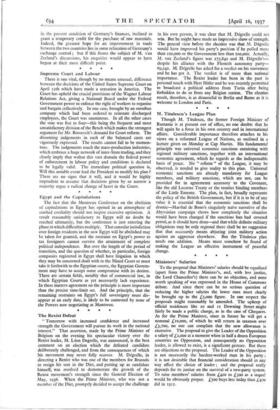The Rexist Defeat " Tomorrow with increased confidence and increased
strength the Government will pursue its work in the national interest." That assertion, made by the Prime Minister of Belgium on the evening his spectacular victory over the Rexist leader, M. Leon Degrelle, was announced, is the best comment on an election which the defeated candidate deliberately challenged, and from the consequences of which his movement may never fully recover. M. Degrelle, in directing a Rexist who was one of the members for Brussels to resign his seat in the Diet, and putting up as candidate himself; was resolved to demonstrate the growth of the Rexist movement's strength since the General Election of May, 1936. When the Prime Minister, who was not a member of the Diet, promptly decided to accept the challenge in his own person, it was clear that M. Degrelle could not win. But he might have made an impressive show of strength. The general view before the election was that M. Degrelle would have improved his party's position if he polled more than roo,000 or the Government less than 200,000. Actually, M. van Zeeland's figure was 275,840 and M. Degrelle's- despite his alliance with the Flemish autonomy party—. 69,242. M. Degrelle has asked for a verdict on his movement and he has got it. The verdict is of more than national importance. The Rexist leader has been in the past in personal touch with Herr Hitler and he was recently permitted to broadcast a political address from Turin after being forbidden to do so from any Belgian station. The election result, therefore, is as distasteful to Berlin and Rome as it is welcome to London and Paris.
* * * *






















































 Previous page
Previous page